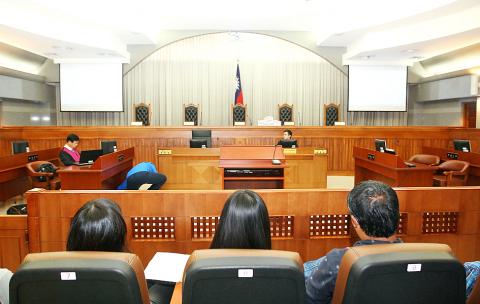Convicted Taipei MRT killer Cheng Chieh (鄭捷) yesterday said he hoped for the judicial process to end soon and that he deserved to be put to death for his crime, as his lawyers continued to put up a legal defense in Cheng’s appeal hearing at the Supreme Court in Taipei.
Citing the exceptional circumstances of the case and its impact on society, the Supreme Court decided — for the first time in the nation’s history — to hear the defendant and his lawyers’ defense in appealing the High Court’s death sentence ruling in October last year.
Cheng, then 21 years old, killed four people and injured 22 in a knife attack on the Taipei Mass Rapid Transit (MRT) System on May 21, 2014. The crime increased public fears of random attacks, and led to concerns about personal safety in public places, with ridership on the Taipei MRT system dropping for several weeks after the attack.

Photo: CNA
Reading from a prepared statement, Cheng said he wanted to apologize to the victims and their families.
“Maybe you will not forgive me, because if I were in your shoes, I probably would not forgive either,” he said. “However, maybe my apology can provide some consolation to you, therefore at this time I would like to apologize again.”
He then thanked the Supreme Court for allowing him to appear at the appeal hearing.
“At the start, I did not want to go through the litigation process. I just wanted to get on with it, to have the execution carried out as quickly as possible,” he said.
Cheng then said that his appeals were on the advice of his legal team.
“My lawyers and some people concerned about my life have put in a lot of effort, and they have also encouraged me. I felt all their endeavors should not go to waste, so I have been cooperating with lawyers through the judicial process, so the judges can listen to what the lawyers have to say,” he said.
Cheng concluded by saying: “I have done wrong and deserve to be punished. Maybe I will be executed in a few months’ time, but for inmates not on death row, what can they do?”
Cheng’s lawyers mounted their defense, with the aim of commuting the death sentence.
They said that when police detained and questioned Cheng, they did not inform him of his right to legal counsel, and cited other possible violations in due process of law.
Meanwhile, families of the victims accused the Supreme Court of “unfair treatment” as they were not notified to appear at yesterday’s hearing, saying that their voices had been silenced, but Cheng was given ample time to express his views.
Lee Jui-chang (李瑞昌), the brother of victim Lee Tsui-yun (李翠雲), expressed outrage at the “preferential treatment” Cheng received.
“When Cheng speaks in court, he does not show any remorse and displays the ‘I do not care’ attitude. Still, he could speak his mind today, but the judges did not want to hear from the victims’ families. We are very angry about this, it is very unfair,” Lee said.

SECURITY: As China is ‘reshaping’ Hong Kong’s population, Taiwan must raise the eligibility threshold for applications from Hong Kongers, Chiu Chui-cheng said When Hong Kong and Macau citizens apply for residency in Taiwan, it would be under a new category that includes a “national security observation period,” Mainland Affairs Council (MAC) Minister Chiu Chui-cheng (邱垂正) said yesterday. President William Lai (賴清德) on March 13 announced 17 strategies to counter China’s aggression toward Taiwan, including incorporating national security considerations into the review process for residency applications from Hong Kong and Macau citizens. The situation in Hong Kong is constantly changing, Chiu said to media yesterday on the sidelines of the Taipei Technology Run hosted by the Taipei Neihu Technology Park Development Association. With

A US Marine Corps regiment equipped with Naval Strike Missiles (NSM) is set to participate in the upcoming Balikatan 25 exercise in the Luzon Strait, marking the system’s first-ever deployment in the Philippines. US and Philippine officials have separately confirmed that the Navy Marine Expeditionary Ship Interdiction System (NMESIS) — the mobile launch platform for the Naval Strike Missile — would take part in the joint exercise. The missiles are being deployed to “a strategic first island chain chokepoint” in the waters between Taiwan proper and the Philippines, US-based Naval News reported. “The Luzon Strait and Bashi Channel represent a critical access

CARROT AND STICK: While unrelenting in its military threats, China attracted nearly 40,000 Taiwanese to over 400 business events last year Nearly 40,000 Taiwanese last year joined industry events in China, such as conferences and trade fairs, supported by the Chinese government, a study showed yesterday, as Beijing ramps up a charm offensive toward Taipei alongside military pressure. China has long taken a carrot-and-stick approach to Taiwan, threatening it with the prospect of military action while reaching out to those it believes are amenable to Beijing’s point of view. Taiwanese security officials are wary of what they see as Beijing’s influence campaigns to sway public opinion after Taipei and Beijing gradually resumed travel links halted by the COVID-19 pandemic, but the scale of

Pope Francis is be laid to rest on Saturday after lying in state for three days in St Peter’s Basilica, where the faithful are expected to flock to pay their respects to history’s first Latin American pontiff. The cardinals met yesterday in the Vatican’s synod hall to chart the next steps before a conclave begins to choose Francis’ successor, as condolences poured in from around the world. According to current norms, the conclave must begin between May 5 and 10. The cardinals set the funeral for Saturday at 10am in St Peter’s Square, to be celebrated by the dean of the College